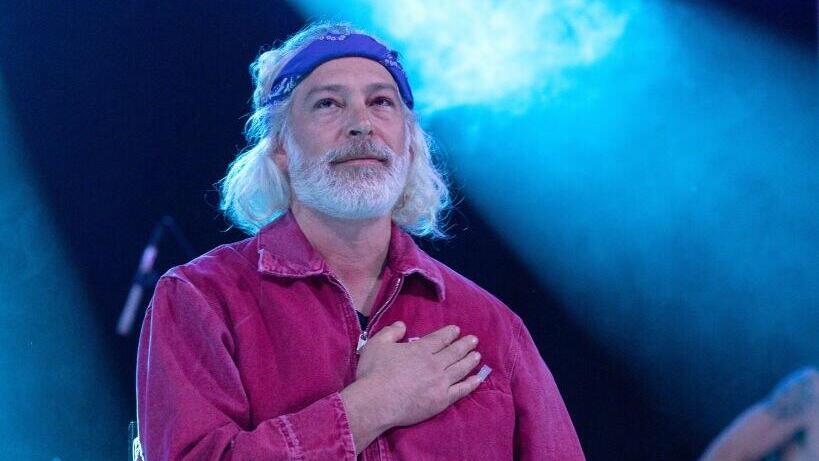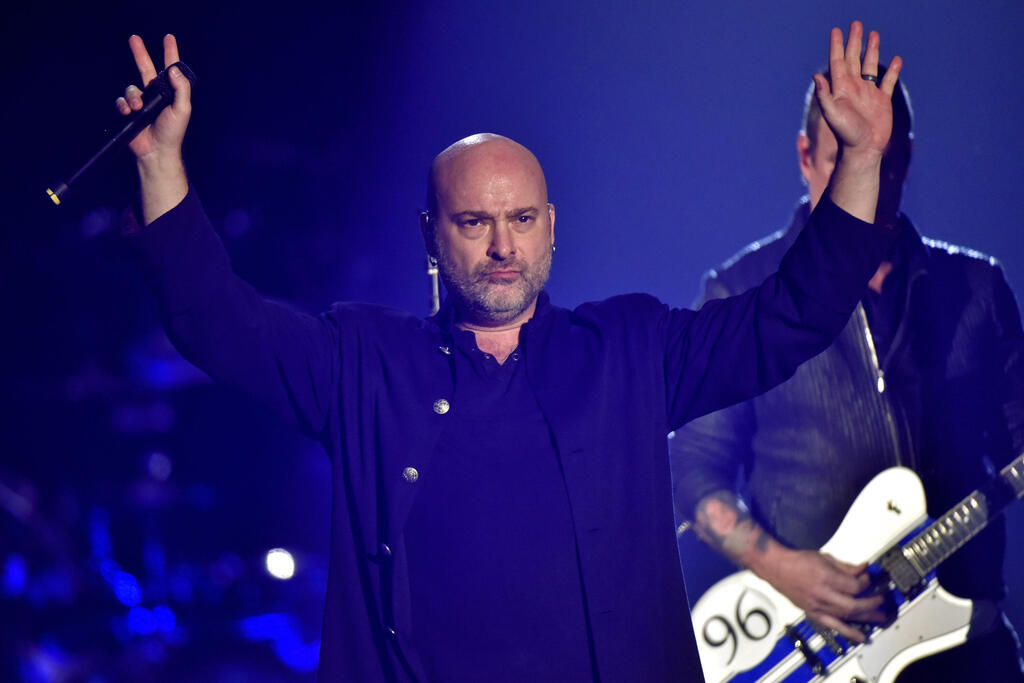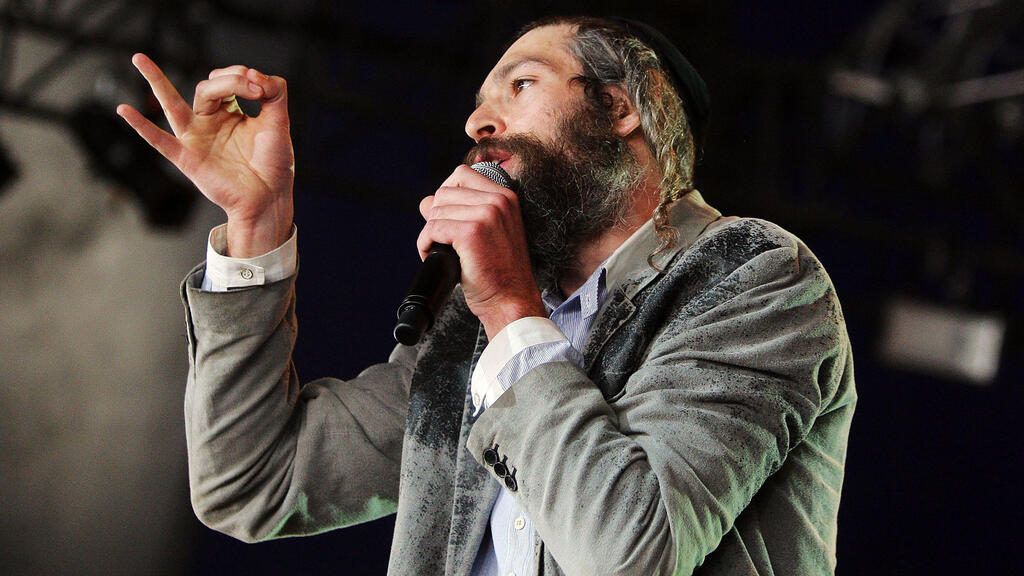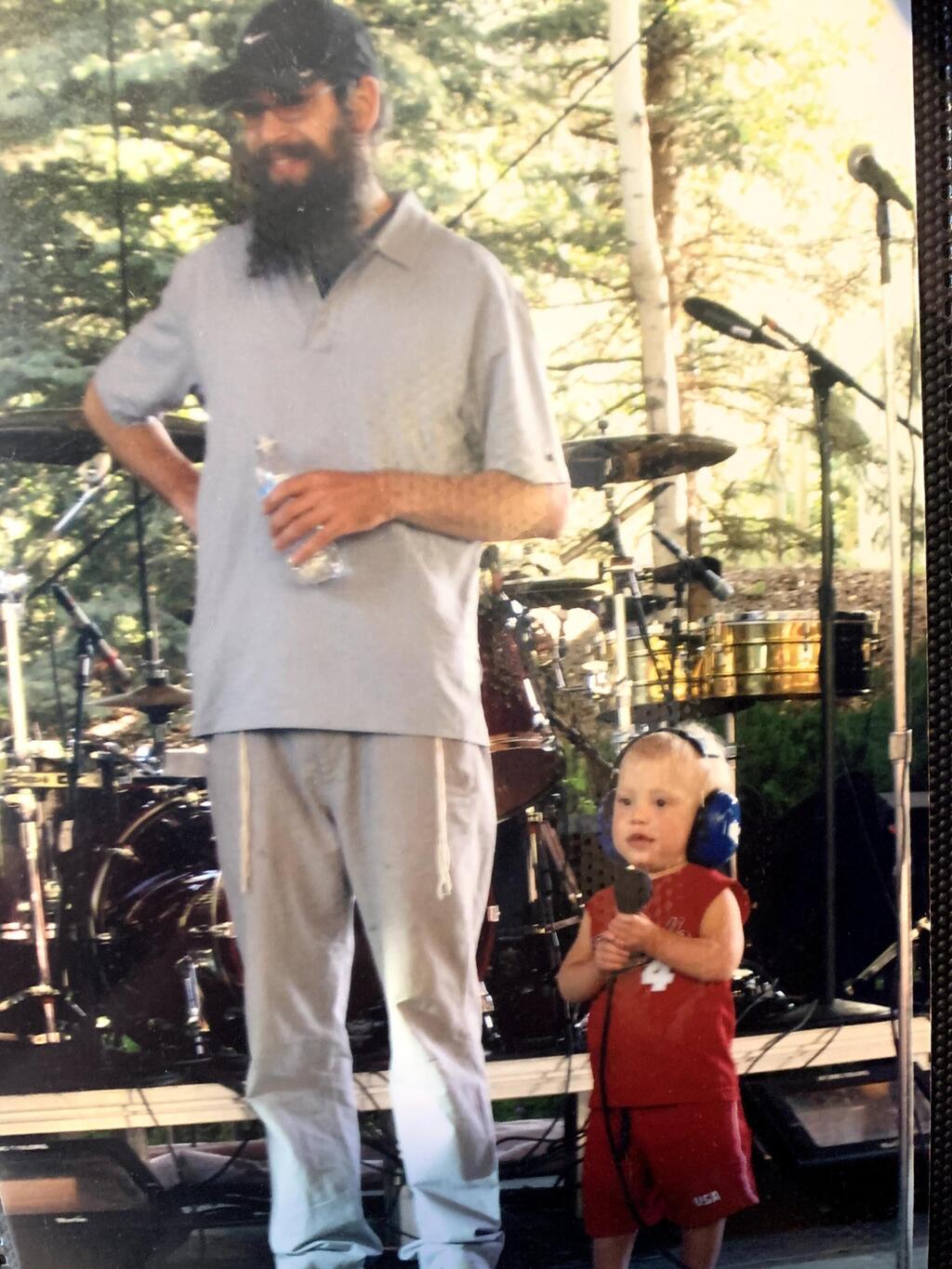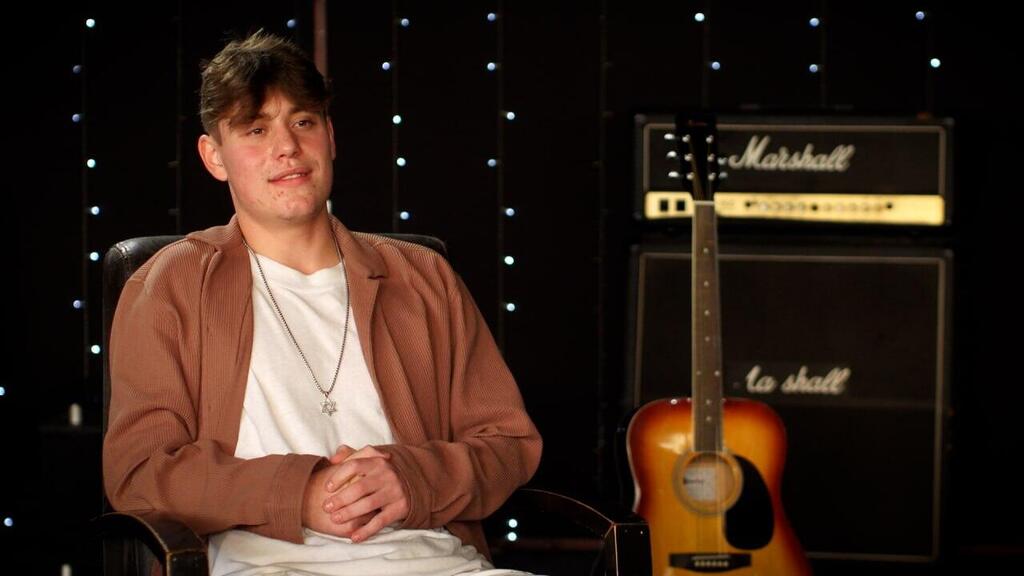Getting your Trinity Audio player ready...
On March 8, at the height of his U.S. tour, American rapper Matisyahu was supposed to take the stage in front of a packed House of Blues in Chicago. Hours before the show, the musician posted an apology on social media, saying his performance was canceled due to "threats in the protests."
"Dear Fans, it saddens me to write this to you," he wrote then, "the true details surrounding this decision remain opaque, and while the responsible parties all point fingers at one another over the decision."
Even now, several weeks after that planned concert, and following further cancellations experienced in Santa Fe and Arizona, the Jewish-American singer still struggles to comprehend the situation and is frustrated by the world's narrow view of what's happening here.
"They all basically happen because of pressure that was put on by these pro-Hamas or anti-Israel groups. Sometimes they even like guide themselves as like Jews4Palestine," Matisyahu tells Ynet in an interview.
'It's very much the culture in America'
"I don't really get too involved in reading what they have to say, but they put pressure on some people. It's very much the culture in America, to believe that Israel is the enemy and is this evil monster and that the Palestinian people are this wonderful people. And there's no talk about Hamas or October 7th or the Nova Festival. No one seems to remember or think about it or talk about it. The only thing that people want to do is point the finger, and if you support Israel or you speak up or you play for soldiers of Israel, then that all of a sudden makes you a genocidal maniac. That's what they're saying about me."
In addition to the cancellation in Chicago, Matisyahu also mentions that one of the scheduled performances was canceled because part of the production team wasn't willing to work with the musician.
"They do this because they are either anti-Semitic or have confused their empathy for the Palestinian people with hatred for someone like me who holds empathy for both Israelis and Palestinians," he wrote at the time, when another show that was canceled later was done so due to fears of violence erupting during the show.
"Sometimes they might be more peaceful you could say, like a megaphone with a drum and a tambourine and they're just 20 people," he shares. "And what they're yelling is 'from the river to the sea', so they're not that peaceful but other times it's a little more intense. They might be trying to intimidate the fans by screaming at them or spitting at them, but my fans are awesome, they're like Israelis - even though they're not Israelis. They don't just cower."
When David Draiman, the lead singer of Disturbed (who performed in Israel last year), heard about the reason for the cancellation, he immediately reached out to him. "We didn't even know each other before this and he just called me," he says. "We spoke on the phone but then he goes 'Hey brother, what do you need?'"
"I said I don't have any security out here, and he's just like 'no problem.' Then my wife tells me 10 hours later, 'You know, there's a GoFundMe page, and David just raised you like $20,000 and sent us one of his security people. Some people have it in their blood to support and fight for the Jewish people."
While in the United States, Matisyahu and his team had to deal with angry protesters and cancellations, the decision to both open and close his tour specifically in Israel amid the war in Gaza, stemmed from a strong sense of connection to the country.
"I knew that I was going out into 34 cities in America, where that's not going to be the feeling. I'm going to be feeling very isolated, very alone and very disconnected," he explains. "In our shows in America you have to come through these protesters and all these angry people, and then you get into the show and people are wearing yarmulkes and have Israeli flags and singing One Day and Jerusalem and there's this real feeling of connection."
"When I got that invitation to accept the Israel Prize I realized it was going to be right at the end of this tour, it just made like perfect sense for me that I started in Israel and then I did 34 shows in America, and then I finished in Israel. I know it's a hard time and it's a struggle, but being in Israel right now is a very special feeling, I feel it's like coming home."
His two concerts that'll be held in Israel on April 2 and 3 are scheduled less than three months after his last visit to the country, during which he donated the proceedings of his show to the Hostages and Missing Families Forum. When asked about his recent visit to Israel, during which he visited the damaged communities near the Gaza Strip, met with survivors from the Nova Music Festival, and performed in front of IDF soldiers - the musician shares a unique moment that left a mark on him.
"When I came, we went straight from the airplane to Kfar Aza and Nir Oz and we visited with the people there and saw the ruin and stepped through the ashes, we to the Nova site and we saw the site of the music festival. That was a super intense experience for me."
'It was one of the most powerful experiences of my life'
"We went from there straight down to play for the Golani soldiers who were coming out of Gaza that day. On the second day, we met with the families of the hostages and went to the hospital and met survivors from the Nova Festival - young people that were in wheelchairs that were telling us their stories. It was one of the most powerful experiences of my life. I think it changed me."
You also had a video in which you sang with IDF soldiers in the field, how was that for you?
"We were all exhausted. I hadn't slept in two days and they obviously, soldiers coming back from Gaza and getting ready to deploy north, everyone was in a down and then we just started playing One Day on the guitar. I don't even know if they knew who I am, and then one by one these guys just started coming around, and you could just feel like the spirit rising until it climaxed at some point, and all the soldiers were holding hands, it was a very special moment."
While artists like Matisyahu and Draiman are outspoken supporters of Israel, there seem to be few voices willing to speak up for us. According to him, we're in the midst of a social and cultural boycott stemming from antisemitism.
Blatant disregard for the events in Israel can also be identified at formal events and ceremonies, such as the Oscars ceremony held two weeks ago - where the yellow ribbons associated with the struggle for the release of Israeli hostages held by Hamas were conspicuously absent. "I've been thinking about this because I'm outraged and angry. Not only did they not wear yellow ribbons, they wore the hand, the bloodied hand."
The Artist4Ceasefire organization pin.
Yeah, but we all know what that picture means. It's like a symptom, you know? When something bad happens and then you see where the cards fall and you see there's only a few people here that really love Israel and really feel connected and feel that the Jewish people and Israel are one thing. I don't know which generation, but it seems like something slipped."
6 View gallery
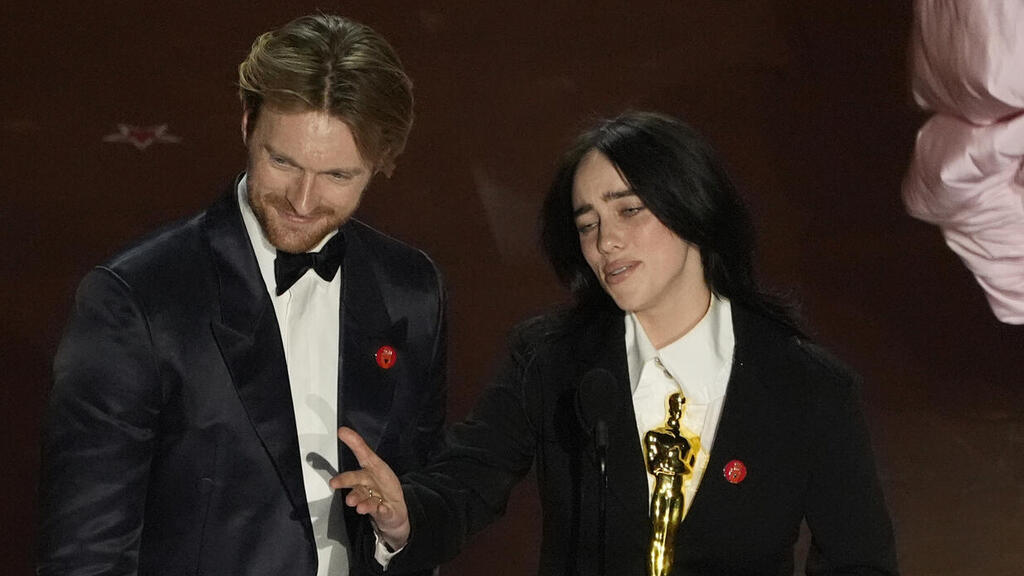

Finneas and Billie Eilish wearing cease-fire pins at the Oscars
(Photo: Jordan Strauss/Invision/AP)
"At some point, this antisemitism, which I think starts with the American Jews themselves, sort of crept into all antisemitism. This weakness is what we're talking about. We're talking about weakness as a Jew and a feeling of disconnect from Israel. A lot of my Jewish friends that I grew up with went to Hebrew school once a week or got a bar mitzvah, and then that was it. So now something like this happens and people are probably asking themselves, 'How important is this to me?' if they still consider themselves as Jews."
Jewish reggae rapper
Matisyahu, 44, whose real name is Matthew Paul Miller, is deeply connected to Judaism - even though he underwent a complex personal process alongside his beliefs. The musician, coming from an ultra-Orthodox background, broke through in 2004 with his hit song King Without a Crown on the U.S. charts and later worldwide.
Until 2011, he was considered a Hasidic reggae singer, blending elements of rap, reggae, and Jewish music in his work, and finding many similarities between the spiritual Rastafarian world rooted in Jamaica and his own Jewish roots.
In the same year, he also stirred up controversy among his Jewish fans when he posted a picture on his Instagram account without his long beard and without a kippah, accompanied by the statement "No More Hassidic Reggae Superstar."
Over the years, the singer's appearance has changed, as has his work, but his deep connection to Israel — which he visited many times throughout his life, whether studying in yeshiva, performing, shooting videos, or with his family — has only strengthened.
"I stand in solidarity with Israel right now," he declares. " I feel closer than I ever have and more connected. And I feel like the hope of the Jewish people lies in Israel and in how we can all support each other right now. I'm so excited and happy to be coming and playing music and it's going to be amazing,"
You often stand for Israel in your shows. Have you paid a price for that as an artist?
"Well, I think for me it's natural. There are all kinds of things going on in the world that I could have taken sides on. Basically, my life has been more focused on my art, and my struggles. If there's something that just hits you right in the chest, you have no choice. I feel blessed and so thankful. There's a lot of things in my life that I've been confused about but I am so sure about this, and it feels good to be so secure in it. Because when you come from that place, and I also come from a pretty spiritual place of belief in God
and you hold strong to that, that's glorious. I feel only good will come from that. I try to get past all the bullshit and focus on what's right."
In addition to being an artist who fights for his values, Matisyahu is also a family man and has six children – Laivy (18), Shalom Dov-Bar (17), and Menachem Mendel (12) from his first marriage that ended in 2014, and a daughter named Sasha Lil (10) from a previous relationship. After marrying his current wife, Talia, in 2019, their family was joined by a pair of children - a daughter named Esti River (4) and a son named Yehuda Mack (2).
Another reason for Matisyahu's strong connection to Israel is his son Laivy's residence in the country, who's studying in a yeshiva, and developing his own musical career.
"Coming to Israel, to a new country with a new perspective and a new foundation was really like eye-opening,” he told Ynet in an interview back in December 2023. "I could have stayed in America, but I wanted to experience more in my life and write more songs and build an audience and a new crowd."
During the outbreak of the war on October 7, Laivy stayed with a friend in Efrat, who woke him up that morning and urged him to run to the protected room. Laivy, still half-asleep, didn’t understand what was happening until he heard a loud explosion outside. "I remember in my chest I felt this feeling that I never really felt before. Like I was in danger and I didn't know what to do."
Laivy was in Israel on that day, when did you realize something serious was happening?
"I woke up early and it was the first thing that we saw. I was in Las Vegas and I hoped he was okay. We tried to get more information about what happened and then we found out he was all right," he shares, saying he felt immense relief.
"I had a big reggae show and there was another Jewish artist I reached out to. I just wanted to connect with him and just have another Jew to talk to. He didn't even answer my text messages, didn't want to have anything to do with it, didn't even want to acknowledge that it even happened, and didn't even want anyone to know he's Jewish."
"And then I started doing my show and I was feeling weird about performing a reggae show in Las Vegas with all this going on. And then I saw someone had an Israeli flag and I brought them up right away. I immediately knew everything has changed now, and I'm stepping into a new mission on that stage."
A week after October 7, Laivy returned to his family in New York, who wanted him to stay with them. Laivy decided to resume working on his music, and together with his father, he performed at Columbia University, which saw several antisemitic incidents and protests across campus.
"You could see the kids’ faces go from scared to feeling united, feeling a togetherness,” Laivy explained, saying that Israel has a variety of Jewish creators while in America, he felt he could contribute more in supporting Israel.
However, after a month of doing so, he felt that his place to be was in Israel and decided to return. "I don't want terrorism to make decisions for me, so I said, ‘Screw it, I'll come back to continue my journey,' and returned here," he said at the time.
Your son came back to Israel after the war broke out, are you thinking of doing the same?
"Yeah, I would love to. I would love to move to Israel."
Laivy went in your footsteps, do your other kids also hold an interest in music?
"They seem to be interested in it," he says. "Esti likes to get up at the VIP area for sound check and I have a stool for her and she sings along with me and steals the show and says she's four years old. Laivy's younger brother Shalom Dov is on tour with me and he just released his first song. And Menachem is in New York. I think if we could get everyone on board, we would all move."
On his previous visit, Israeli singer Netta Barzilai performed with Matisyahu. "I'm trying to remember who connected us. You know how Israel is, everybody knows someone," he said and added that he's working to raise funds to establish an Israeli ensemble to accompany him on his shows.
About a month ago, Matisyahu released his new EP Hold The Fire, featuring a blend of reggae, Afro-beat, and trap. "The songs that were put together before October 7 have this new context."
He explains the dissonance between his optimistic song Fireproof and End of the World, whose title might evoke pessimism. "It's speaking of a place, the end of the world but not. If you look at the lyrics, the lyrics just completely makes sense for what's happening right now. It's not so much about the end of times, it's more about a place and maybe that place could be Israel."
Do you still believe in your songs' optimism? That people with different opinions can coexist?
"Optimistic, I don't know? But as a Jew, you have to have a vision of peace. It's a vision. It's like a prophecy. I used to pray a lot and you're saying all these great things about God that you might not be feeling, you might not be seeing, but you're still trying to like, paint this picture."
"We realize that we're partners in creation, and so we actually created the world that we live in with our words, with our thoughts. If you let go of the vision of peace it can't be good. Obviously, we have to eliminate the evil."



